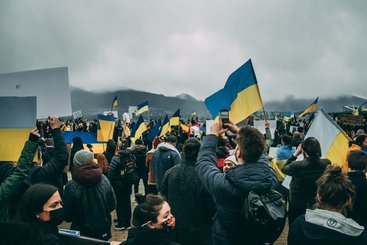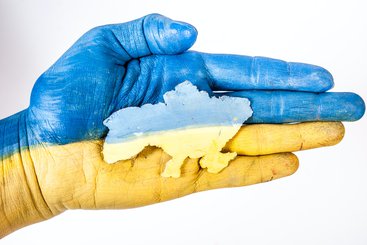A week on from the Russian invasion of Ukraine, fighting continues across all major Ukrainian cities despite the unprecedented sanctions against Russia from Europe, the US and other NATO members. One might have expected that neighboring Central Asia, a region with strong economic and commercial ties to Moscow, would have publicly endorsed the Kremlin.
Central Asia’s economies remain heavily dependent on Moscow, largely due to remittances, resulting in adverse effects across the region from the plunge of the ruble in the wake of western sanctions. However, despite the significant socio-economic impacts across Central Asia, Moscow has failed to receive substantial support, with none of the five former Soviet republics rushing to endorse the Kremlin’s decision to invade.
Russia’s actions in Ukraine also places Central Asian states in a difficult position due to their close security association with Moscow whether it be with the Russia-led military bloc – the Collective Security Treaty Organisation (CSTO) of which Kazakhstan, Kyrgyzstan and Tajikistan are members, or via economic dependency and integration through the Eurasian Economic Union (EAEU) which include Kazakhstan and Kyrgyzstan as members. Uzbekistan, while not a EAEU member, also holds strong economic and trade relations with Moscow.
Central Asian leaders are especially cautious over Ukraine due to the rising threat of Russian expansionism within their own countries. This is an immediate concern across the region following increasing pro-Russia rhetoric from senior Russian politicians over the last years in support of reunification with former Soviet territories. This has also been a crucial factor for Central Asian governments in shaping what their future partnership with Russia will look like, particularly in the context of expansionism threats.
The leaders of the smaller two Central Asian nations, Tajikistan, and Turkmenistan, have so far refrained from making any public announcements on the developing situation, keeping to their policy of non-interference. The Kazakh Foreign Ministry was quick in its response to the invasion stating that it would not recognise the republics of Donetsk and Luhansk or provide troops to support the Russian invasion. Uzbek President Shavkat Mirziyoyev’s press secretary echoed the same view stating that Uzbekistan holds a “balanced and neutral position on the matter.” The Kyrgyz President Sadyr Japarov commented that the invasion could be necessary to protect the peaceful population in Donetsk despite previous claims that Bishkek was taking a neutral stance on the issue. In response, Ukrainian President Volodymyr Zelenskyy recalled its ambassador to Kyrgyzstan.
Western sanctions will equally impact the regional economy
Russia remains a prime destination for Central Asian labour migrants with remittances from workers a key reason for Central Asia’s reliance on Russia’s economy. Consequently, the economic sanctions against Russia have already begun to damage the regional economies. The majority of remittances come from Russia which account for 30% of the Tajik GDP, 28% for Kyrgyzstan and 12% for Uzbekistan. This is a further blow to the regional economies which have just begun to recover from the Covid-19 pandemic which severely impacted domestic economies.
The timing of the conflict is particularly significant for Kazakhstan (Central Asia’s largest country), which suffered its own period of political unrest only in January resulting in major government reshuffles and domestic instability. Kazakhstan receives a high level of foreign direct investment, particularly in the oil and gas sectors, and it has had difficulty in re-building trust with investors since the January unrest, an important point for Kazakh leaders to consider when discussing Ukraine. It is likely the Kazakh government will continue to distance itself from Russia in an effort to boost investment to the economy and will remain committed against supporting Russia in the war.
Nevertheless, Moscow has been trying to counter these economic concerns by attempting to influence the regional economies through calling an EAEU session to deal with the newly imposed international sanctions. Russia sought financial solidarity from a recent trip to Nur-Sultan but was met with limited support by its Central Asian EAEU counterparts. For now, Russia remains alone in its plight to secure economic support from its neighbours – nations upon which it previously could readily rely. Failure to secure support was also noted with reports that Kazakhstan allegedly refused to send Russia military support, despite being a CSTO member, indicating Kazakhstan’s position against Russian aggression in Ukraine.
The situation in Ukraine hits close to home
Over the past decades, the five Central Asian countries have prioritised nation and identity building. Therefore, Russia’s justification for the invasion as the liberation of ethnic Russians in Donetsk and Luhansk is of major concern across the region, particularly for Kazakhstan given the large concentration of ethnic Russians located in the north of Kazakhstan.
The 2014 annexation of Crimea proved to be a turning point in Kazakh-Russia relations as it confirmed Nur-Sultan’s fears that Moscow was prepared to use force to connect with its former Soviet republics. It also underscored that Kazakhstan would be vulnerable towards future Russian aggression. In an attempt to mitigate this risk, ethnic Kazakhs from the south were relocated to the northern regions. Nonetheless, these concerns have intensified with recent hostile rhetoric from senior Russian politicians claiming Kazakhstan should return land known to be historically Russian. The latest comments from President Putin describing Ukraine as a historically Russian land has reignited such concerns of further Russian expansionism. In response to these concerns, there has been a mutual effort from the five republics to try and pivot away from Russia’s influence and seek alternative partners – politically, economically as well as culturally. Turkey, as a founding member of the Organisation of Turkic States, a union of Turkic nations, has become an alternative partner for Central Asia alongside China and the UAE.
Central Asian leaders will continue to be anxious over the Russia-Ukraine war. With further sanctions expected, the indirect socio-economic impacts on an already volatile region should not be overlooked. The smaller economies of Central Asia, which are more politically dependent on Moscow, could be pressured by Russia to support the war – although support would likely be out of necessity to prevent damaging bilateral relations rather than genuine endorsement. However, this would come at a high domestic cost considering the general mistrust towards Russia and reluctance from the Central Asian population towards deeper political ties with Moscow. This could also spark civil unrest across the region including anti-government protests rejecting closer relations with Russia.
The actions taken by Russia in Ukraine could be observed as a precursor for further Russian aggression in Central Asia in keeping with the justification to liberate areas with large ethnic Russian populations. It is important that the efforts of Central Asia to diversify relations with Russia are not discarded as a result of being caught in the middle of a war which it has little to no influence over.



